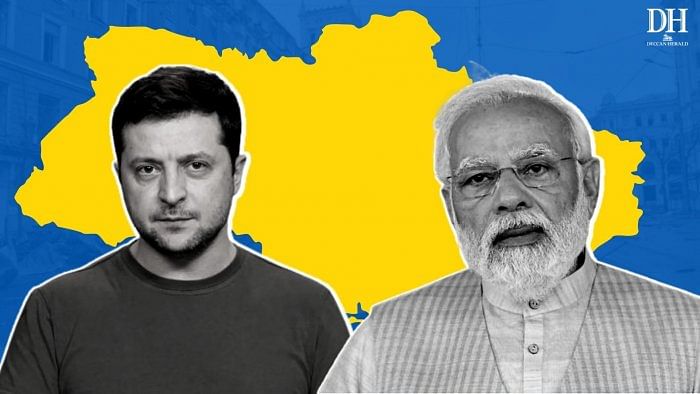
Ukraine has asked India to help implement the “peace formula”, which the beleaguered East European nation’s president, Volodymyr Zelenskyy, recently proposed to end the conflict with Russia.
New Delhi has conveyed to Kyiv that it would support any peace effort to end the conflict.
Zelenskyy and Prime Minister Narendra Modi had a phone-call on Monday.
The two leaders had earlier spoken to each other several times after Russia launched its “special military operations” in Ukraine on February 24. The phone-call on Monday was however the first between them after after India took over the presidency of the G20 on December 1 last and Ukraine proposed a 10-point “peace-formula” to end the conflict with Russia.
Modi had also spoken to Russian President Vladimir Putin on phone on December 16 last.
Zelenskyy on Monday wished Modi a successful G20 presidency.
Modi will host the 18th G20 summit in New Delhi on September 9 and 10 next year.
“It was on this platform (G20) that I announced the peace formula and now I count on India's participation in its implementation,” the president of Ukraine posted on Twitter.
Zelenskyy had first put forward his 10-point “peace formula” while addressing the G20 leaders during the 17th summit of the bloc at Bali in Indonesia last month.
It included steps to ensure radiation and nuclear security, food security, energy security, release of all prisoners of war and deportees, restoration of territorial integrity of Ukraine, respect for United Nations Charter by Russia, total withdrawal of all troops by Russia from Ukraine, punishment for war crimes, protection for the environment, stopping Russia's ecocide in Ukraine, new security architecture and security guarantees for Ukraine and, finally, signing of peace treaty between Ukraine and Russia.
Modi “strongly reiterated his call for an immediate cessation of hostilities and said that both sides should revert to dialogue and diplomacy to find a lasting solution to their differences”, according to a press-release issued by the Prime Minister’s Office in New Delhi after the phone-call with Zelenskyy. The prime minister also conveyed New Delhi’s “support for any peace efforts” to end the conflict, it added.
The prime minister told the president of Ukraine that main priorities of India's G20 presidency included giving a voice to the concerns of developing nations on issues like food and energy security.
New Delhi has been drawing flak for not joining the western nations in strongly condemning Moscow’s aggression against the East European nation. India refrained from echoing the US and rest of the West primarily in view of its decades-old strategic partnership with Russia and its continued reliance on military hardware procured from the former Soviet Union nation. India has been circumventing sanctions imposed by the US and the other western nations on Russia and continuing bilateral trade. It has also increased oil and coal imports from Russia.
Modi’s “it-is-not-the-era-of-war” appeal to Putin, delivered during a bilateral meeting on the sideline of the SCO summit at Samarkand in Uzbekistan on September 16, however, was hailed by the media and the governments in the western nations.
India over the past few months also increasingly reasserted its role as the voice of the “Global South” as it highlighted in all multilateral forums how the food, fuel and fertilizer crises triggered by the Russia-Ukraine war hit hard the developing nations and slowed down the post-Covid-19 economic recovery.
Modi and Zelenskyy discussed opportunities for strengthening bilateral cooperation. The prime minister requested Ukrainian authorities to facilitate arrangements for the continued education of Indian students who had to return from the East European nation earlier this year.
